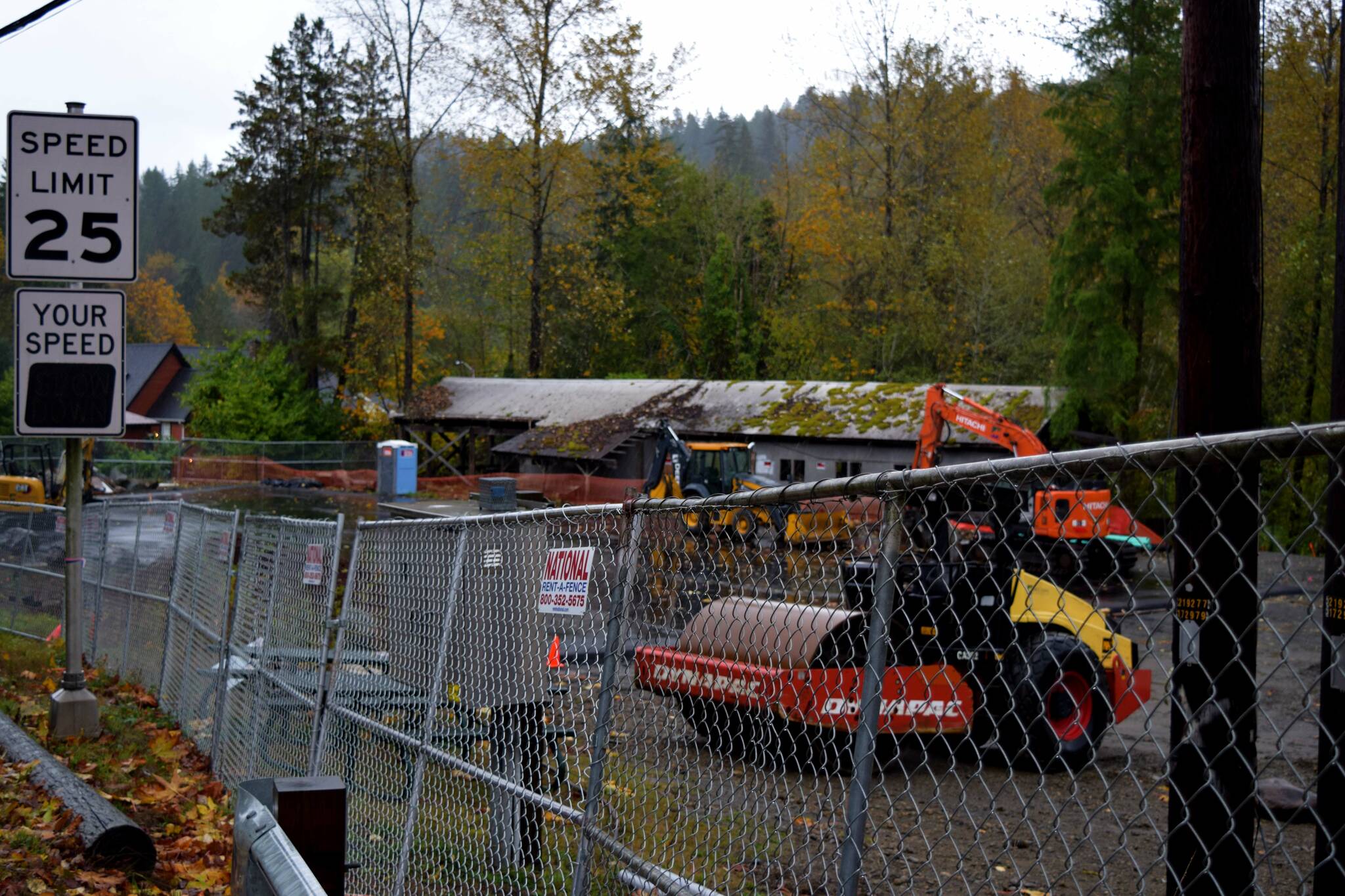Backed up against the Raging River, the few gray, moss-covered buildings at Preston Mill Park are some of the last remnants of a once burgeoning mill site.
Since opening, and replacing a former shingle mill, the 22-acre park along Preston-Fall City Road holds a large part of the community’s history — and has gone largely untouched.
But some 25 years after opening, construction is underway to bring long-coveted improvements and preserve the space’s history.
Construction began this past summer as part of a partnership between Mountains to Sound Greenway Trust and King County Parks.
“The primary mission was for it to be a public gathering space, but have it tell the story of the mill site that was there,” TJ Davis, a program manager with King County Parks, told the Fall City Community Association.
“[We’re] finally bringing Preston Mill Park into the public park realm and not just this strange piece of property that’s been down there since 1997,” he said.
Phases and stages
Construction is taking place in phases, with the first phase — bringing new trails, a paved parking lot, restrooms and a new pedestrian tunnel that will connect the park to the Preston Community Center — wrapping up this summer.
A second phase will add a picnic shelter and determine what will happen with the two mill site structures still standing on the property. The old mill shed building, which can be seen prominently while driving along Preston-Fall City Road, is in disrepair and will have to come down, Davis said. Current plans are to redesign the space into an interpretive exhibit.
Meanwhile, local historians are in the midst of an application process, hoping to gain landmark status for Mill Park’s other structure, the kiln building.
“We do not want to see that building come down,” said Rick Divers, vice president of the Fall City Historical Society.
Divers, whose ancestors worked at the Weyerhaeuser Mill in Snoqualmie, got involved in the project a year ago and noted the importance of preserving the mill’s history.
“To see them preserve it as a park for future generations is invaluable,” he said. “It preserves a little history and opens it up to the public.”
Both buildings are remnants of the Preston Mill Company, which operated from 1896 to 1990, with two mills along the Raging River. What’s now Preston Mill Park was once a shingle mill, while a lumber mill was upstream. Many of Fall City’s early buildings used lumber from the Preston Mill.
The mill company was founded by Swedish-American immigrants August and Emil Lovegren, who drew European immigrants, mostly of Swedish descent, to work at the mill. By 1929, the mill employed roughly 200 men.
Interest in the space as a park came from the Preston Vision, a 1997 document co-authored by residents, Mountains to Sound Greenway, King County Parks and the Washington State Department of Natural Resources, outlining a future plan for the community.
“The community came together to envision what Preston wanted for their future,” said Amy Brockhaus, deputy director of Mountains to Sound Greenway Trust. “That was the beginning of the public process.”
The plan included a desire for parks and open space, Brockhaus said, resulting in King County’s purchase of both Preston Mill Park and what is now Preston Athletic Fields that same year.
Preston Mill Park remained untouched until 2015, when Jim Ellis, founding president of Mountains to Sound Greenway Trust, gave a call to action, Brockhaus said.
“He said ‘hey, you should do some interpretive work at the park, it’s just sitting there,’” she said. “A decade later, it’s a $1.6 million construction project with King County Parks.”
Ellis, a civic leader, conservationist and Preston community member, is best known for preserving parks, farmland and negotiating the clean-up of a polluted Lake Washington. As a teenager in the 1930s, he and his brother built a cabin along the Raging River.
Preston Mill Park, the Preston Community Center and Preston Athletic Fields are collectively known as the Jim Ellis Memorial Regional Park.
That name change was spurred by former King County Councilmember Kathy Lambert, who recalls Ellis coming to her with a bold vision for the Mill Site Park over a decade ago.
Even after leaving office last year, Lambert remains connected to the project, hoping to keep the final outcome as close to Ellis’ original vision as possible. She even secured the grant funds being used to examine landmark status for the kiln building.
“Jim’s looking down on me,” she said, “and I’m still working on it.”


